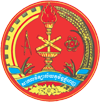Background

The Biotechnology and Food Technology Master Program is designed for students who wish to study the application of biological, chemical, engineering, and physical principles to the conversion of raw agricultural products into processed foods suitable for human consumption, the nature of foods, the causes of deterioration, the principles underlying food processing, and the improvement of food quality and safety for public consumption. The Program intends to prepare engineers for life-long achievement through both education in Biotechnology, Food technology, and sustainable refining of natural products in Cambodia and also development of communication, teamwork, leadership and entrepreneurship skills.
The Biotechnology and Food Technology Master Program is one of the graduate study programs in the Department of Bio-Engineering, Faculty of Engineering, Royal University of Phnom Penh. The study program has been evaluated and reviewed periodically. Under the financial support from the Swedish International Development Agency (SIDA), the Master program was developed in partnerships with three different Swedish universities - the Swedish Agricultural University, Lund University, and Umeå University. The Department of Bioengineering at RUPP sees this as a clear possibility to create a stronger and more sustainable research group within the Faculty of Engineering. For researchers at all involved universities this represents a unique opportunity to form an interdisciplinary research team around challenging research issues of large human relevance.
Vision
In this program, we propose to strengthen the research and research training capacity of the Royal University of Phnom Penh (RUPP) in the areas of biotechnology, bioengineering and food science. The program consists of research training at the master level that will be established at RUPP in cooperation with the partner universities and subsequently transferred here. By this approach, we believe we will meet the demands for quality in higher education and that a stepwise selection scheme will warrant that the upper levels of education will be offered to the crème de la crème of our domestic students, based purely on academic merits.
Strategy
-
The strategy is to integrate groups in adjoining areas of fundamental science as well as in technology to create an interdisciplinary research environment within the Faculty of Engineering, in collaborations with the Faculty of Science and with the Department of International Business Management.
-
The strategic objective of the Department of Bioengineering at RUPP is to establish a general competence in processing of biological raw materials to create valuable products. This includes a wide range of raw materials from agriculture, forestry, and fishery, and involves the production of foods and materials as main the products, as well as utilization of a wide range of organic side streams into foods, feeds, or as sources of bio-derived chemical raw materials.

PROGRAM LEARNING OUTCOMES
Master Degree in Biotechnology and Food Technology (MBFT)
Upon a successful completion, a graduate of this program will be able to
Knowledges
-
Explain and evaluate on food and biotechnology’s values (1) instrumental analysis, (2) advance biochemistry, (3) industrial biotechnology, (4) plant biotechnology, (5) advance food technology, (6) fermentation technology, (7) Bioprocess Engineering, (8) entrepreneurship skill and project management
-
Experience in scientific research both direct and industrial work environment
-
Experience in establishment and management on project with innovative business model in food and biotechnology to meet the job current and future job market in food and biotechnology industries.
-
Develop business and start-up project in biotechnological fields.
-
Work independently, as part of a team and able to carry responsibilities in operation process and research
-
Illustrate the value of biotechnology to the public
-
Evaluate the performance of commonly used process in biotechnological fields such as gene technology, industrial microbiology, Enzyme technology, food technology and plant cell technology.
-
Demonstrate skill in the usage of computer, network, and software packages relevant to chemistry, biotechnology, basic statistic and engineering.
-
Oral and/or poster presentation in national and international conferences/symposium
- article
-
Manipulate and handle glass-wares, lab. Instruments, chemicals and biological materials in advance
-
Operate engineering process equipment in biotechnological field such as food processing and bioprocessing.
-
Perform and experiment qualitative and qualitative experimentation in biotechnological field such as gene technology, industrial microbiology, Enzyme technology, food technology and plant cell technology.
JOB PROSPECTS
Biotechnology and Food Technologists have good job perspectives. Graduates generally find a job in the food industry, agro-industry, or at the government, universities or institutes. Around 10% of the graduates will pursue a PhD degree
- Food and Agro-industry specialists
- Bimolecular and Biomaterial engineer
- Process design for food industry
- Research and Development for products
- Biomedical scientist and lab technician
- Entrepreneur with technology
- Lecturer/researcher in the field.
- Continue for Doctoral degree
Contact Info

Department of Bio-Engineering
- www.rupp.edu.kh
- bioeng.info@rupp.edu.kh
- Tel: (+855)77 23 5040/78 78 4154
- 103 STEM Building, Campus I, Russian Confederation Bolvd., Toul Kok, Phnom Penh, Cambodia
Scholarship

For students who are looking for a scholarship, RUPP provides a number of sources of scholarships. read more...
